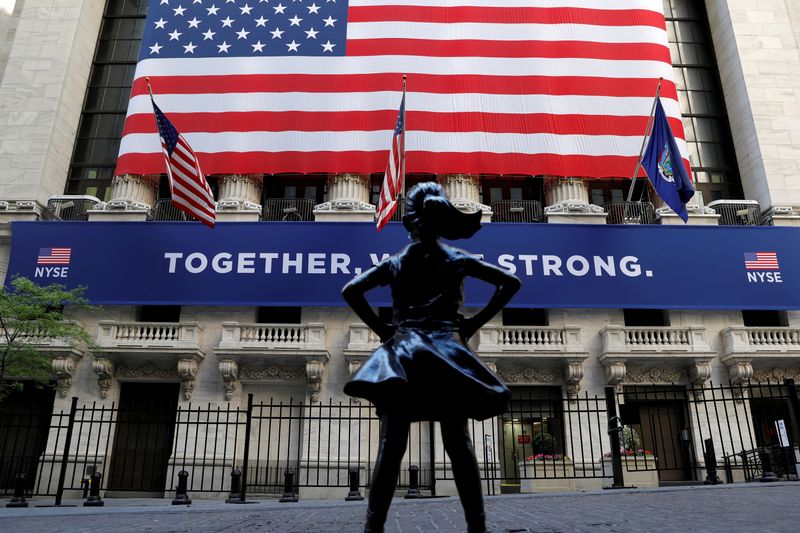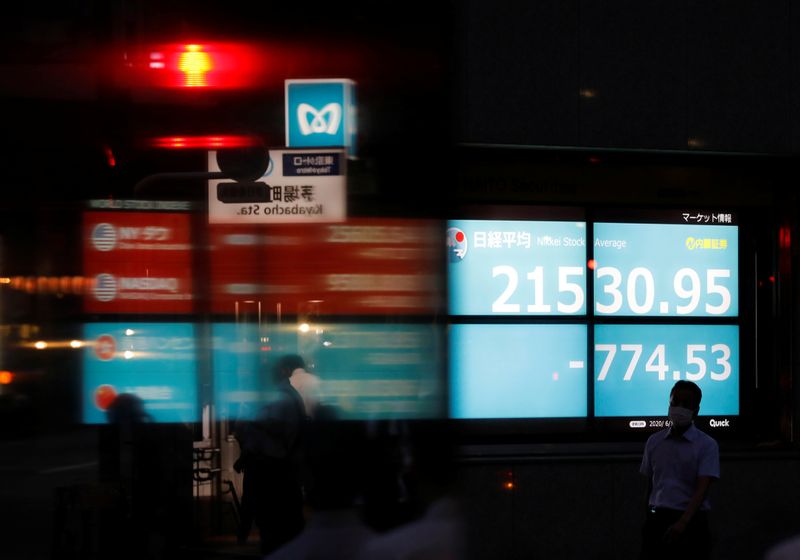By Herbert Lash
NEW YORK (Reuters) - Demand for safe havens rose and global equity markets turned south on Friday after Apple Inc said it would temporarily shut 11 U.S. stores as coronavirus cases continue to rise, rekindling fears of a deadly second wave of the pandemic.
News of Apple's (O:AAPL) move involving stores in Florida, Arizona, South Carolina and North Carolina doused hopes for a quick economic recovery that had spurred risk appetite earlier in the day, driving up European and U.S. stocks about 1%.
Treasury yields fell and the dollar rebounded from early losses as it posted its best weekly gain in a month. Gold rose more than 1%, with futures settling above the technical barrier of $1,750 an ounce, a breakout that should push bullion higher.
Apple's decision portends more restrictions coming back as coronavirus cases rise and the reopening process stalls, said Edward Moya, senior market analyst at currency brokerage OANDA.
The $1,750 mark "has been a big barrier for gold and speaks strongly that the safe-haven trade is not going away anytime soon," Moya said.
Stocks in Europe pared some gains but closed higher before the Apple news broke. Investors remained hopeful that a massive 750 billion euro stimulus package will soon be passed, though European Union leaders made little progress in negotiations.
The Nasdaq's early surge above the 10,000 mark had put the tech-heavy index on track to a record closing high, but Apple's announcement foiled that milestone even though Nasdaq closed moderately higher.
MSCI's gauge of stocks across the globe (MIWD00000PUS) shed 0.20% while the pan-European STOXX 600 index (STOXX) closed up 0.56%. Emerging market stocks rose 0.60%.
On Wall Street, the Dow Jones Industrial Average (DJI) fell 204.38 points, or 0.78%, to 25,875.72. The S&P 500 (SPX) lost 17.22 points, or 0.55%, to 3,098.12 and the Nasdaq Composite (IXIC) added 3.07 points, or 0.03%, to 9,946.12.
Investors have been tugged in opposite directions by improving economic data and new outbreaks of COVID-19 infections. California, North Carolina and a string of U.S. cities have mandated or urged mandatory mask use to contain spiraling coronavirus cases.
Mainland China reported 32 new coronavirus cases as of the end of June 18, 25 of which were reported in Beijing, China's National Health Commission said.
Oil prices pulled back sharply from early highs on concerns the pandemic's continued spread could hamper the recovery.
Boston Federal Reserve President Eric Rosengren said more fiscal and monetary support for the U.S. economy will likely be needed, echoing comments by the European Central Bank chief, who said the EU's economy was in a "dramatic fall."
Brent futures (LCOc1) rose 68 cents to settle at $42.19 a barrel while U.S. crude (CLc1) settled up 91 cents at $39.75.
ECB President Christine Lagarde called on EU leaders to agree on their recovery plan quickly, diplomatic sources and officials said. The leaders are divided over its final size but hope a deal will be struck in July.
The dollar index (=USD) rose 0.193%, with the euro (EUR=) down 0.16% to $1.1184 and the Japanese yen
Demand for German government debt was little changed, with the benchmark 10-year Bund yield at -0.415% (DE10YT=RR).
Benchmark 10-year notes (US10YT=RR) rose 0.1 basis points to yield 0.6954%, coming off higher yields of 0.745% earlier in the session.

U.S. gold futures
